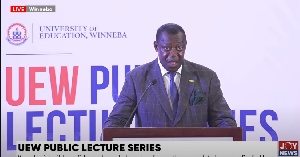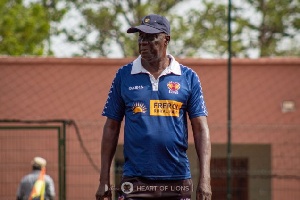- Home - News
- Elections 2024
- News Archive
- Crime & Punishment
- Politics
- Regional
- Editorial
- Health
- Ghanaians Abroad
- Tabloid
- Africa
- Religion
- Photo Archives
- Press Release
General News of Friday, 11 April 2025
Source: www.ghanawebbers.com
Most Ghanaians are like single-phased wires -Prof. Akosa
Imagine entering a room with two light switches. One switch controls a single-phase system, and the other controls a two-phase system.
If the single-phase system fails, the lights go out. In contrast, the two-phase system keeps one light on even if one phase fails.
Professor Agyeman Badu Akosa, a well-known pathologist and academic, used this analogy to describe intellectual engagement in Ghana.
During his speech at the University of Education, Winneba (UEW) Public Lecture Series on April 11, he stated that many Ghanaians think in one dimension.
He believes this limited thinking is due to the country's educational approach.
Prof. Akosa compared narrow thinking to a single-phase electrical system. If one idea fails, there’s nothing else to rely on.
He urged the audience to critically examine how education constrains Ghanaians' ability to understand complex issues.
His main message focused on reforming Ghana’s education system for multidimensional thinking. He emphasized starting this change in early childhood education.
Prof. Akosa believes critical thinking must begin early in a child's life.
"If we want to change how people think, we must change how we teach," he said.
He criticized traditional teaching methods that promote linear learning. Teaching "A is for Apple" does not foster critical thinking, he explained.
These foundational methods lack tools for analysis or questioning ideas. Instead, he called for an educational shift that encourages exploration of multiple perspectives.
A key part of this change involves bilingual education. He suggested teaching children primarily in their mother tongue until age eight.
This method would help children understand their world deeply in their native language. English could then be introduced later when they can better process concepts.
"If we adopt this method," he said, "children's vocabulary and cognitive skills will amaze us."
Prof. Akosa believes empowering children to think in both languages fosters intellectual flexibility needed for today's interconnected world.
Beyond language, he envisions a fundamental shift in how Ghanaians view education. Every child has potential but needs an encouraging education system to realize it.
"Our children are thinkers; they need the right environment," he stressed.
This shift is crucial for moving Ghana from “single-phase” thinking to more dynamic thought processes.
He urged institutions like UEW to lead this educational revolution: "UEW can become the birthplace of this change."
Prof. Akosa's message was clear: Ghana cannot maintain an educational system that limits children's growth intellectually.
The current approach does not prepare them for future challenges requiring critical thinkers who engage with diverse perspectives.
Ghana needs learners empowered to analyze from different angles rather than confined by “single-phase” thinking.
"The future of Ghana depends on how we educate our children today," Prof. Akosa stated emphatically.
His vision includes a bilingual and multidimensional education system focused on developing future leaders capable of tackling complex challenges.
Transforming Ghana’s education must start now with young minds leading the way forward: "The change starts with us here at UEW."
He concluded with a call to action for educators and policymakers alike: The nation’s intellectual future relies on embracing multifaceted approaches beyond single-phase limitations.











